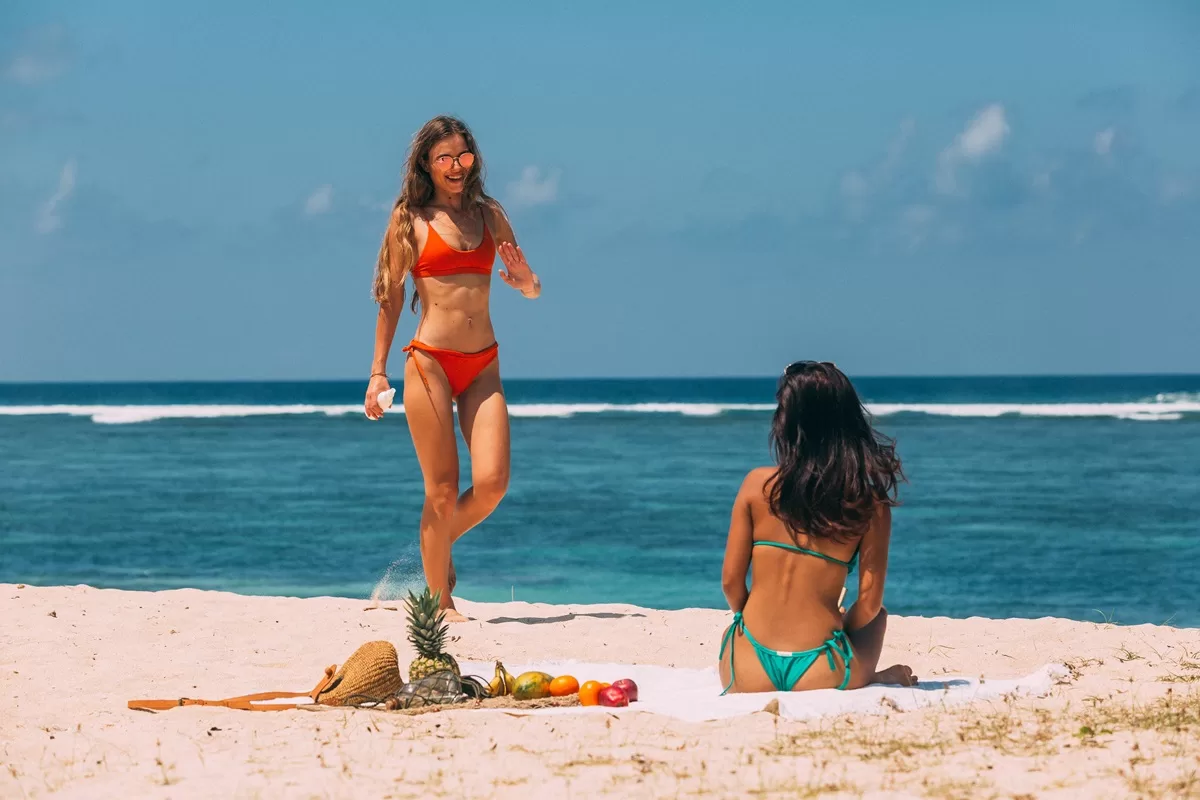Shopping for new swimwear in the UAE to start off the summer season can sometimes feel like a momentous task. Searching the latest trends, narrowing down silhouettes and deciding whether it’ll be a bikini or a one-piece that gives you the support you need — it all takes a lot of thought.

At the height of the season, when you’re looking for the perfect swimsuit or a couple of new ones to upgrade your poolside look, keep the following tips in mind to make your shopping experience easier.
6 Things to Consider Before You Shop for a Swimsuit
1. Know Your Body Type
Every body shape is different, and so is every swimsuit. When you start by identifying your body type, you’ll be able to find the best style to accentuate your figure and boost your confidence.
Women have different body types, such as apple, pear, hourglass, athletic and more. To pinpoint your body type, measure your shoulders, bust, waist and hips. Then, compare the measurements to find out your body shape.
For those with an hourglass figure, high-waisted bikini bottoms can draw attention to their slim waist and emphasise the curves. Pear-shaped bodies, also known as inverted triangles, can benefit from high-cut bottoms that make legs look slimmer and longer, as well as plunging necklines that balance out broad shoulders. Apple-shaped bodies can opt for tankini tops paired with high-waisted bottoms to tone and flatter their figure.
With all that said, it’s important to remember that there are no set-in-stone rules for what you should and shouldn’t wear. The perfect swimsuit is the one that makes you feel most comfortable and confident. So, don’t be afraid to experiment with different patterns, designs and styles.
2. Get the Right Fit
Some women rely on the size they usually wear to determine their swimsuit fit. However, this can be a mistake since not all brands have the same sizing charts. So, before buying from a specific store, check their size chart to find the right one.
And if you’re not shopping online, always try on the swimsuit first. Looking good on a hanger doesn’t automatically mean it’s the right swimwear for you.
3. Think About the Occasion
Certain swimsuits are better suited for specific occasions than others. For example, if you’re lounging by the pool or going for a light swim, a one-piece swimsuit or a bikini with a frill or a bandeau top and stylish bottoms could be ideal.
Alternatively, suppose you plan on participating in water activities like surfing, kayaking, paddleboarding or beach volleyball. In that case, you might want to go for a swimsuit that stays in place and offers more coverage and support. Options like a bikini with a sports bra top or a one-piece with adjustable straps and a secure fit are usually best for a more active beach day.
Think of what you’ll be doing in your swimsuit and choose a style appropriate for the occasion.
4. Decide on Coverage
The level of coverage you’re happy with is also a big factor in finding the right swimsuit. There are usually three options to choose from:
- Complete coverage includes swimsuits with short bottoms, tankinis and one-pieces.
- Moderate coverage refers to swimsuits with bottoms and tops that are supportive but don’t necessarily offer much coverage. Halter tops, bandeau tops and high-waisted bottoms are among the most popular designs.
- Minimal coverage is for those comfortable showing more skin and includes designs like string bikinis, thongs and monokinis.
And if you happen to find a style you liked but it wasn’t available in the coverage you preferred, you can always pair it with a beach dress cover-up or sarong to make you feel more at ease.
5. Mind the Fabric
The type of fabric a swimsuit is made of can significantly affect how it looks, feels and holds up in the water. The most commonly used swimwear materials are:
- Nylon and spandex blends are lightweight, stretchy and quick-drying, making them an excellent choice for active beachgoers.
- Polyester blends are known for their durability and hold up well against chlorine and other chemicals.
Once again, the activities you plan on doing while wearing your swimsuit will help you decide the best choice of fabric. For instance, if you’re going to be spending a lot of time in the pool with chlorinated water, you’ll need a material that can withstand the potential damage or fading, like polyester. Nylon and spandex blends, on the other hand, would be perfect if what you’re after is comfort and flexibility.
6. Look for Support
A swimsuit with good support will create a flattering silhouette and alleviate any discomfort. There’s a whole range of support options available in swimwear, including underwire, moulded cups, padded cups and shelf bras.
If you have a larger bust, underwire bras can give you all the support you need. Moulded and padded bras usually help highlight women’s natural shape. And for ladies with smaller bust sizes who still need a bit of support, shelf bras are a fantastic choice.
Shopping for Swimwear
With these tips, you’ll be sure to find the swimsuit that’ll make you look and feel your best. Remember to have fun with it, and don’t be afraid to try out new styles and designs.


